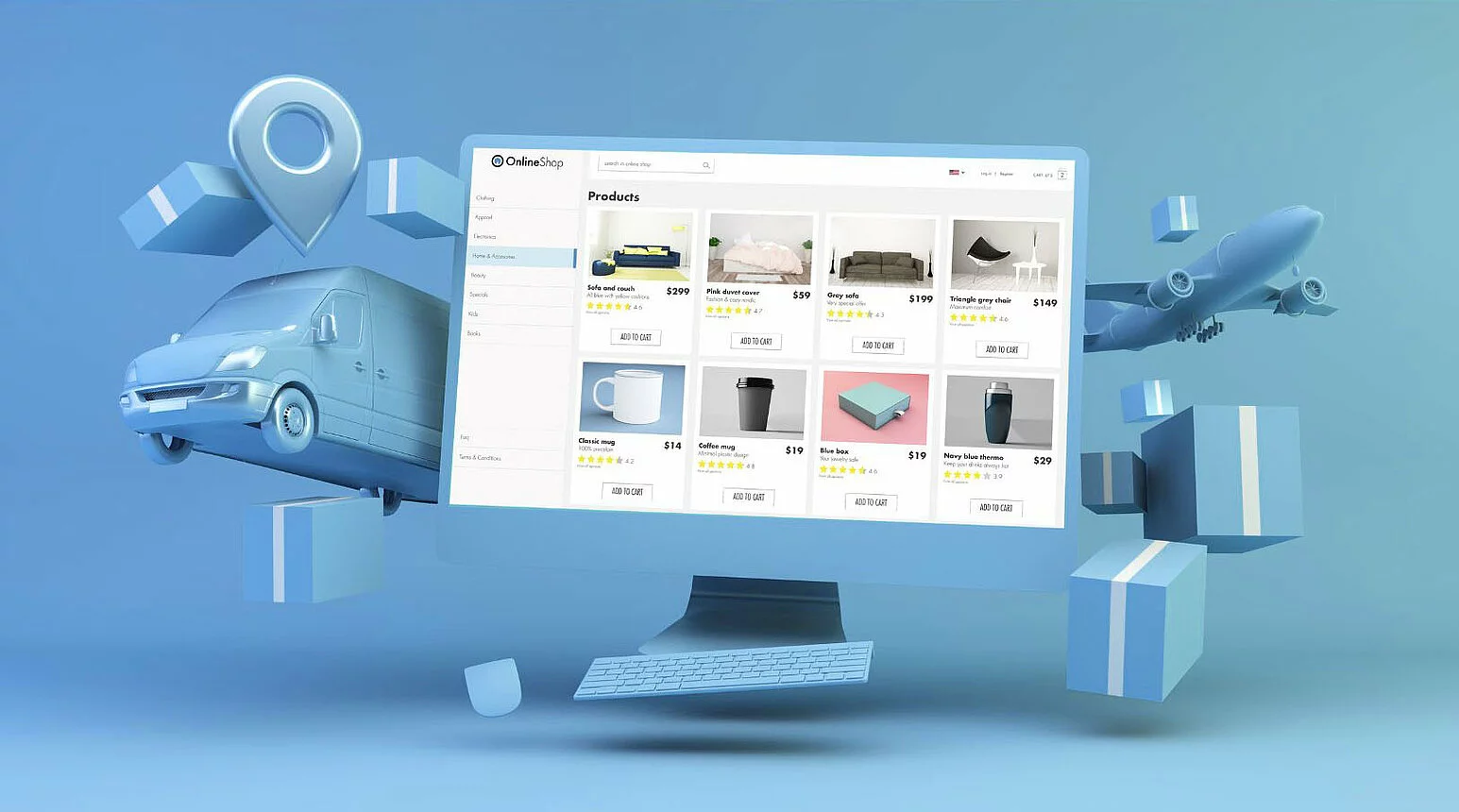The big step by step guide to start your own professional online store in 2024

Hey there! If you haven't dived into the world of e-commerce yet, it's about time to start your own online store! But, you might be wondering, how do you actually go about setting up an online shop, and what important factors should you keep in mind?
No worries! We've got you covered with our ultimate guide to running an online store. We're here to help you create your very first online store, so you can kickstart your business with a bang!
BONUS: Your completely free e-book “The Online Shop Guide 2024”
With ALL the important information about online stores summarized, including a checklist on: Which is the best one, how to start it and what to look out for?

- Pros and cons of online stores vs. brick-and-mortar shops
- How online stores and brick-and-mortar shops can work together
- The three ways to set up an online business!
- Understanding the difference between an online store and an e-commerce platform
- Exploring the benefits of starting an online store
- Taking a closer look at the disadvantages of online trading
- Important considerations when starting an online store
- The legal requirements - A handy checklist
- The most important Online store features - Top tips to boost your store's success!
- Online store logistics: Best practices to streamline your operations
Pros and cons of online stores vs. brick-and-mortar shops
The competition in the online market is intense! Numerous online stores are competing for customers' favor, not only on Google. However, fear not! You can surely enter the race with your online store and achieve success! The key is to select the right online store system, and fortunately, there are plenty to choose from.
The retail landscape has undergone a complete transformation: Shopping no longer solely revolves around traditional local stores but has significantly shifted towards online stores.
However, local stores still come with some awesome perks:
- Customers can directly view and try products in the stores before making a purchase. Trying out products remains one of the best incentives for buying!
- They can also seek advice from salespeople and be more effectively convinced about a product.
- Brick-and-mortar stores often have a special atmosphere and provide an experience that online stores cannot replicate in the same way.
So, why should you start an online store?
- You can offer a much wider range of products that customers can order from anywhere.
- Often, products are available at more affordable prices than in brick-and-mortar stores, as the goods don't need to be displayed and can be shipped directly from the warehouse.
- Online trading is open 24/7, allowing your customers to shop conveniently at any time!

How online stores and brick-and-mortar shops can work together
One smart approach is for companies to expand their online presence by establishing an online store alongside their physical shop.
By doing so, they can reach customers who don't live near the local store or might face limitations in visiting in person. Furthermore, businesses can enhance customer loyalty through diverse marketing strategies such as social media campaigns or email advertising.
The brick-and-mortar store and the online store can complement each other seamlessly in their offerings:
For instance, the online store could offer a broader selection of products compared to the local shop, which may focus on showcasing highlights or selling large, bulky items directly. By integrating both channels and promoting cross-referencing, you can significantly boost both your sales and customer satisfaction!
When you run a physical store, expanding into e-commerce allows you to increase your brand awareness by establishing a presence in both the physical and digital realms. Moreover, it provides a safety net, especially during challenging times like pandemics, when your physical store might face temporary closures. By operating both local and online shops, you gain enhanced flexibility, enabling you to respond more effectively to dynamic market changes.
- While each sales channel has its own unique advantages and disadvantages, cleverly combining them creates an unbeatable synergy. The crux of the matter lies in comprehending customer needs and implementing tailored strategies to reach them. By doing so, you can achieve remarkable success, both in the online and offline domains!

The 3 ways to set up an online business!
- Firstly, you can opt for an online store system that allows you to create your store relatively easily on your own. Some examples of such systems include Shopify, WooCommerce, or PrestaShop.
- Alternatively, you have the option to delegate the entire development process to a web agency. They will handle everything for you using platforms like WordPress with WooCommerce, Adobe Commerce, or OpenCart.
- Lastly, you can leverage existing e-commerce platforms like Amazon, eBay, or similar ones to sell your products. This approach offers the advantage of tapping into the existing customer base and reach of these platforms.
Understanding the difference between an online store and an e-commerce platform
Both options represent websites with different scales and distinct functions:
An online store is exclusively owned by a single company that sells its products.
- Advantage:
You enjoy an unrivaled position on the site - it's all about your brand. You have full control over the development and operation of your online store, allowing you to customize it according to your vision and effectively showcase your brand. Additionally, there are no external parties dictating fees or taking a share from your sales.
- Disadvantage:
However, the onus is on you to attract customers to your online store. You must invest in marketing efforts to extend your store's visibility beyond word-of-mouth referrals. Building brand awareness and driving traffic to your website requires strategic and continuous efforts.
E-commerce platforms like Amazon or Alibaba, on the other hand, offer a multitude of companies the opportunity to sell their products through them.
- Advantage:
The major benefit is that you gain access to a ready-made and efficiently optimized marketplace where you can operate. Your products become discoverable through the platform's general search function, allowing customers to add items from various companies into a single shopping cart, much like shopping in a supermarket. This convenience creates a strong selling point for marketplaces like Amazon or Alibaba.
- Disadvantage:
However, this convenience comes at a cost, as you'll be subject to fees from the respective platform. Additionally, you need to ensure that your products are presented in the best possible way within the framework defined by the e-commerce platforms. Customization options may be visually limited. Moreover, depending on the product category, the competition can be intense, posing challenges that you'll need to navigate.
Bonus Tip: In e-commerce, it is now considered best practice to have both your own online store and sell through Amazon. Many companies generate significantly more revenue there due to the vast reach of the online giant compared to their own online stores.
- By the way, you can find all the pros and cons of Amazon's selling platform in this post.
Exploring the benefits of starting an online store
Whether you already operate a brick-and-mortar store or not, these points apply equally to every company:
- Greater Reach
A physical store typically has limited reach, as it can only attract customers from the local area or nearby regions. However, with an online store, you can break geographical barriers and reach customers from all corners of the world, thus significantly expanding your target audience. Embrace the opportunity to sell your products internationally!
- 24/7 Open
Unlike a physical store with specific opening hours, your online store remains open 24/7, allowing customers to place orders at their convenience. This way, you won't miss out on potential sales outside of regular business hours, ensuring a continuous flow of orders.
- Better Advertising
Online marketing opens up vast opportunities to promote your store strategically and expand your presence on the internet. Leveraging techniques like SEO (Search Engine Optimization), SEA (Search Engine Advertising), or social media marketing, you can precisely target your desired audience and effectively promote your products. This enhances your visibility and drives more traffic to your online store, increasing your chances of making sales.

- No physical presentation needed
The beauty of online stores lies in their virtual nature, eliminating the need for physical storefronts, shelves, or on-site sales staff to showcase products. Instead, products can be directly dispatched from the warehouse, which not only saves space but also reduces ongoing costs significantly. Moreover, with fewer personnel required compared to a physical store, you can often offer lower product prices, delighting your customers with better deals.
- Improved customer retention
An online store provides numerous opportunities to personalize your offers for customers, creating a superior shopping experience. By implementing theme-specific promotions or organizing your online shop based on target groups, you can uniquely address individual customer preferences, fostering a sense of loyalty that pays off in the long run.
- Greater flexibility and return policy
As products are not physically tryable, many shops and retailers offer an extensive return and cancellation policy. This varies depending on the retailer and state in the US but is often significantly more generous than what is offered by brick-and-mortar stores, which, in turn, attracts and wins over many customers.
- Return or exchange options are not legally mandated for physical stores but are based on voluntary offers by the companies!
Taking a closer look at the disadvantages of online trading
- The personal contact is missing
In online commerce, the personal contact between you and your customers or employees is absent, which can lead to customers feeling uncertain and deciding not to make a purchase.
- No testing possibility
Customers cannot directly test or try on your products on the internet. Therefore, many hesitate before making a purchase and may end up changing their minds.
- Lower trust
Since customers cannot physically touch and test the products, there will inevitably be more erroneous purchases and a higher return rate, along with logistical effort and material waste.
A reputable reputation is of great advantage here, as can be seen with e-commerce giants like Amazon, Zalando, or AboutYou. Being present with your products on Amazon, for example, increases customer trust. Selling through various well-known channels adds to your credibility and can lead to greater sales.
- More returns
Since customers cannot physically touch and test the products, there will inevitably be more erroneous purchases and a higher return rate, along with logistical effort and material waste.
- Competition
The online market is highly competitive, and companies must compete against numerous competitors. Without a precise plan, entering the world of e-commerce can be challenging.

How to start an online store: Important considerations
- You have your business plan ready, your business idea formulated, and you have considered your target audience and the market? These are distinct and essential topics that you should thoroughly examine before starting an online store!
If so, here are the essential tips to bring your online store idea to life!
To start with, you must first define the legal framework. Depending on the country where you operate, there are various legal requirements that you need to consider as an entrepreneur.
These may include:
- Choosing the legal structure,
- Registering your business,
- and possibly trademark registration.
There are also different points that your website or online store must include, according to the applicable local law, such as:
- Privacy policy,
- Cookie banner,
- Terms and conditions (T&C),
- Imprint,
- Cancellation and return policy,
- Liability information, and Trademark rights
There are various points that your website or online shop must contain in any case according to local law! You can find out exactly what these are in our comprehensive eBook, the Online Shop Guide!
Registering a business for your online store:
You can register your business at the companies house in the UK.
It depends in which country youre starting.. If youre a german seller for example, you can register your company at the local trade office (Gewerbeamt) in Germany.
Analyze your target audience
Before creating an online store, carefully examine your target audience:
- What products can improve the lives of your customers?
- What sets your online store apart from others?
- Who are your potential customers, and what are their needs?
- Which products should you offer online, considering logistics?
- How can you best showcase your products?
A comprehensive analysis of your target audience will help you build your online store successfully and according to a plan. Study what your competitors are doing and take inspiration from them. Create a structure and think about how you can excel!

Things to consider with online shop systems:
There are many different online store systems available in the market, varying in functionality and cost. Based on your business plan, you know best how it should look and what features are needed. Get an overview and select the online store system that best fits your company and your preferences.
The checklist - things to consider with online store systems:
- Webshop creation and simultaneous (domain) hosting with the online store system provider.
- Included templates for website layout and legal texts.
- Customizable design and marketing tools.
- Included standard data protection agreement / cookie banner.
- Integration possibility of external software, such as Google Analytics or ERP systems.
- Pre-integrated payment service options.
Here are some of the most widely used online store systems globally, relied upon by millions of merchants:
An overview of the online shop systems:
- WooCommerce - https://woocommerce.com/
- Shopify - https://www.shopify.com/
- Adobe Commerce (formerly Magento) - https://business.adobe.com/at/products/magento/magento-commerce.html/
- BigCommerce - https://www.bigcommerce.com/
OpenCart - https://www.opencart.com/
You can find a wide selection of online shop systems for every need in our free online shop guide!
User-friendly optimization:
The design of your webshop is your calling card. Create a professional and user-friendly design so that your customers can quickly navigate and be fully convinced of your offerings.
Ensure that your online store is optimized for mobile devices, as a large portion of online customers place orders via smartphones!
Invest in Online Marketing:
To ensure that customers find your online store, online marketing is essential. Utilize all available marketing channels, such as Google or social media, to increase your reach and target customers effectively. Invest in high-quality content and optimize your website for search engines to improve your Google search rankings.
Bonus Tip: Word-of-mouth marketing is still the most effective advertising tool! If you sell high-quality products, word will spread, reducing your reliance on online marketing. You can combine both approaches by collaborating with micro-influencers on social media platforms, who can promote your products to their followers.
Offer fast and reliable shipping:
Customers do not want to wait long for their packages! Logistics is a critical factor in online commerce that significantly impacts customer retention and satisfaction.
The best example? Amazon! They have successfully built a positive image through fast delivery and straightforward refunds. Therefore, optimize your logistics processes to ensure they don't become bottlenecks that impede your business. Provide swift and reliable shipping to keep customers happy and coming back for more!
- Tip from our logistics experts: If you need assistance with your logistics, you can also outsource it to professional fulfillment providers. Find out when it makes sense for you to do so in this article!
Download the free e-book as a PDF "The Online Shop Guide 2024":

It contains numerous additional tips and information on the following topics:
- How much does an online shop cost and how much start-up capital do you need?
- Which online shop provider is the best and what are the differences?
- What free online shops are there?
- Which business do I need to register for an online shop?
- What legal aspects do I need to consider for an online shop?
... And much more! Download your big online shop guide now.
Sources
*Sources: Statista, Tooltester, Smartstore - 2021/22
**Blog article: As at the end of August 2023 - Prices and offers from online shops are subject to change.
Page: Right of return - customers have these rights
URL: https://www.ihk-muenchen.de
Page: Right of cancellation in stationary retail?
URL: https://www.versandhandelsrecht.de
Page: Exchange: What you should consider when buying!
URL: https://ooe.arbeiterkammer.at/beratung/
Page: Which legal form is the right one for my online shop?
URL: https://www.haendlerbund.de/de/ratgeber/
Page: Setting up an online shop
URL: https://www.usp.gv.at/gruendung/
Page: Shop systems in eCommerce
URL: https://www.seo-kueche.de/
Page: Opening an online shop: Legal requirements
URL: https://www.fuer-gruender.de/
Page: Advantages and disadvantages of e-commerce companies
URL: https://www.haendlerbund.de/
Page: Prevent purchase cancellations
URL: https://www.tecchannel.de
Image sources:
Logsta / Quivo © 2023
Canva





